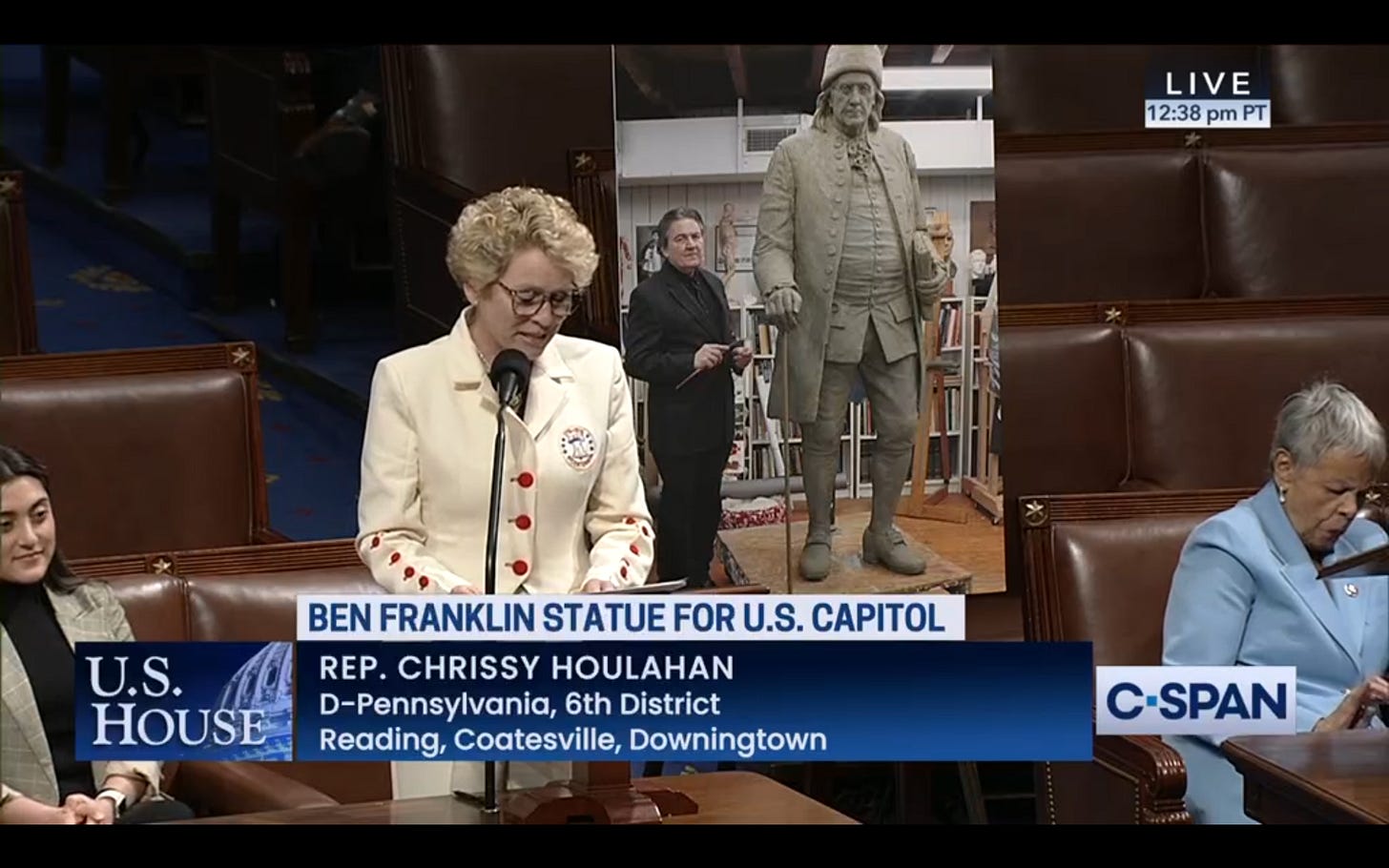Benjamin Franklin Statue Placement Act
Proposal to add a statue of Benjamin Franklin in the U.S. Capitol at a time when history and facts are under attack.
As I’ve scanned backwards through the C-SPAN archives this year, I stumbled upon a bipartisan piece of legislation that wants to further honor Benjamin Franklin with a statue on the U.S. Capitol Tour route.

The Benjamin Franklin Statue Placement Act was reintroduced in early February this year, co-sponsored by Representatives Chrissy Houlahan (D-Pennsylvania) and Brian Fitzpatrick (R-Pennsylvania) in the House and Senators Chris Coons (D-Delaware) and John Boozman (R-Arkansas) in the Senate.
The legislation aims to “place a statue of Franklin in the Capitol before the end of 2026, which coincides with America’s 250th anniversary,” according to the press release. Fun side note: As Washington, DC ramps up activity around the upcoming 250th anniversary of the country, among the activities is a new commemorative stamp from the U.S. Postal Service honoring Benjamin Franklin, the nation’s first postmaster general.
But Back to the bill. According to the Congressional Record:
The nonpartisan legislation will allow Congress to place a statue of Benjamin Franklin in the Capitol. The legislation will require that not later than 2 years after enactment, the Joint Committee on the Library shall enter into an agreement to obtain a statue of Benjamin Franklin. It will also be required that the statue be placed in a publicly accessible permanent location no later than December 31, 2026.
The remarks during discussion of the legislation on the House floor are a good, brief summary of Franklin’s contributions to the American experiment. They’re worth reading in this moment where facts and history are regularly under attack.
You can read them in full here, but I’ve excerpted them below.
Congressman Morelle (D-New York):
"..while there are references to Benjamin Franklin across the Capitol and a statue tucked away in a back hallway, it is black when there are no lights on. There is no statue of one of the most important Founding Fathers accessible to the millions of visitors who have the privilege of touring the Capitol each year.”
He helped draft both the Declaration of Independence and the United States Constitution, and he negotiated the treaty that ended the Revolutionary War. His genius has shaped our Nation in innumerable ways, and he deserves to be prominently displayed and honored in the United States Capitol.
Congressman Fitzpatrick (R-Pennsylvania):
Benjamin Franklin lived his life with a deliberate sense of purpose, beginning each day by asking: What good shall I do on this day? And ending every evening in reflection: What good have I done today?
Madam Speaker, that is not just a measure of a life well lived. It is the measure of leadership, of duty, and of a nation that strives always to be better than it was the day before. Let us take up that challenge not merely in words but in action.
Congresswoman Houlahan (D-Pennsylvania):
Arguably, Mr. Franklin’s most important accolade is that he is the only person to have signed formally all three foundational documents separating our new Nation from the British monarchy.
The Treaty of Paris, the Declaration of Independence, and the Bill of Rights, together known as the Charters of Freedom, boast the signatures of some of our Nation’s most revered figures. Mr. Franklin’s signature is the only one that appears on all three documents, however. That is not only something worthy of note, but something, of course, to celebrate.
This is why I was shocked when I learned on my very first official tour of the Capitol Building—which was given to me by my own team member, Emma Consoli, who is the one we really should thank for this legislation—that there are no statues on the Capitol tour of Mr. Franklin.
Indeed, Mr. Franklin’s lone statue sits at the base of a stairwell, a dark stairwell, just off the Senate floor, out of sight of the hundreds of thousands of people who visit the Capitol.
We’ll keep an eye out whether a statue appears before the end of 2026. Right now, the legislation has been referred to the Senate Committee on Rules and Administration.



